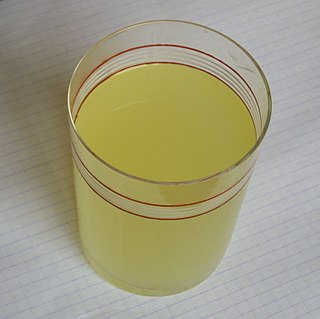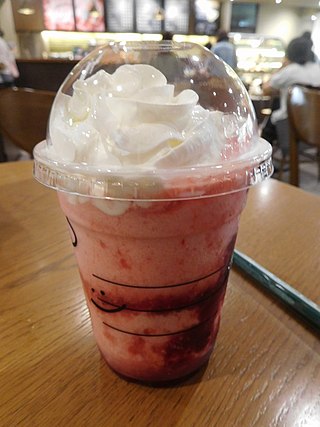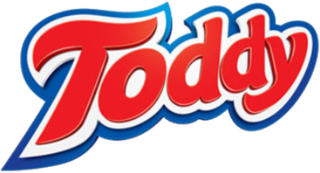
Whey is the liquid remaining after milk has been curdled and strained. It is a byproduct of the manufacturing of cheese or casein and has several commercial uses. Sweet whey is a byproduct resulting from the manufacture of rennet types of hard cheese, like cheddar or Swiss cheese. Acid whey is a byproduct brought out during the making of acid types of dairy products, such as strained yogurt.

Gatorade is an American brand of sports-themed beverage and food products, built around its signature line of sports drinks. The drink is manufactured by PepsiCo and is distributed in over 80 countries. The beverage was developed in 1965 by a team of researchers led by Robert Cade. It was originally made for the Gators at the University of Florida to replenish the carbohydrates that the school's student-athletes burned and the combination of water and electrolytes that they lost in sweat during vigorous sports activities.

Horlicks is a British sweet malted milk hot drink powder developed by founders James and William Horlick. It was first sold as "Horlick's Infant and Invalids Food", soon adding "aged and travellers" to their label. In the early 20th century, it was sold as a powdered meal replacement drink mix.

Frappuccino is a line of blended iced coffee drinks sold by Starbucks. It may consist of coffee or crème base, blended with ice and ingredients such as flavored syrups and usually topped with whipped cream and or spices. It may also include blended Starbucks refreshers. Frappuccinos are also sold as bottled coffee beverages in grocery stores, convenience stores and from vending machines.

Milo is a chocolate-flavoured malted powder product produced by Nestlé, typically mixed with milk, hot water, or both, to produce a beverage. It was originally developed in Australia by Thomas Mayne (1901–1995) in 1934.

Whey protein is a mixture of proteins isolated from whey, the liquid material created as a by-product of cheese production. The proteins consist of α-lactalbumin, β-lactoglobulin, serum albumin and immunoglobulins. Glycomacropeptide also makes up the third largest component but is not a protein. Whey protein is commonly marketed as a protein supplement, and various health claims have been attributed to it. A review published in 2010 in the European Food Safety Authority Journal concluded that the provided literature did not adequately support the proposed claims.
Bodybuilding supplements are dietary supplements commonly used by those involved in bodybuilding, weightlifting, mixed martial arts, and athletics for the purpose of facilitating an increase in lean body mass. Bodybuilding supplements may contain ingredients that are advertised to increase a person's muscle, body weight, athletic performance, and decrease a person's percent body fat for desired muscle definition. Among the most widely used are high protein drinks, pre-workout blends, branched-chain amino acids (BCAA), glutamine, arginine, essential fatty acids, creatine, HMB, whey protein, ZMA, and weight loss products. Supplements are sold either as single ingredient preparations or in the form of "stacks" – proprietary blends of various supplements marketed as offering synergistic advantages.

A milk substitute is any substance that resembles milk and can be used in the same ways as milk. Such substances may be variously known as non-dairy beverage, nut milk, grain milk, legume milk, mock milk and alternative milk.

The RS Spyder is a racing car designed by Porsche in conjunction with Penske to compete in Le Mans Prototype Class 2 (LMP2) racing. The car takes its name from the legendary Porsche 550 Spyder of the 1950s. The car marked Porsche's first return to the top level of sports prototype racing since the firm abandoned its Porsche LMP in 1999.
Propel Water is an American brand of flavored bottled water that is marketed as containing antioxidants and vitamins. It is a beverage product of Gatorade and is marketed by PepsiCo.
MET-Rx is an American brand of nutritional supplements originally produced by Met-Rx, Inc., a California company started by Scott Connelly, and sold several times since.

Ensure is an American brand of nutritional supplements and meal replacements manufactured by Abbott Laboratories.

Sports nutrition is the study and practice of nutrition and diet with regards to improving anyone's athletic performance. Nutrition is an important part of many sports training regimens, being popular in strength sports and endurance sports. Sports nutrition focuses its studies on the type, as well as the quantity of fluids and food taken by an athlete. In addition, it deals with the consumption of nutrients such as vitamins, minerals, supplements and organic substances that include carbohydrates, proteins and fats.

A smoothie is a beverage made by puréeing ingredients in a blender. A smoothie commonly has a liquid base, such as fruit juice or milk, yogurt or ice cream. Other ingredients may be added, including fruits, vegetables, non-dairy milk, crushed ice, whey powder or nutritional supplements.

Bang Energy is an American brand of energy drinks made by Vital Pharmaceuticals, a corporation located in Florida. As of 2023, Bang was the fourth-highest-selling energy drink in the United States, behind Monster, Red Bull and Celsius.

Dry cocoa solids are the components of cocoa beans remaining after cocoa butter, the fatty component of the bean, is extracted from chocolate liquor, roasted cocoa beans that have been ground into a liquid state. Cocoa butter is 46% to 57% of the weight of cocoa beans and gives chocolate its characteristic melting properties. Cocoa powder is the powdered form of the dry solids with a small remaining amount of cocoa butter. Untreated cocoa powder is bitter and acidic. Dutch process cocoa has been treated with an alkali to neutralize the acid.

Toddy is a brand of products owned and manufactured by PepsiCo. As of today, it is mainly marketed and sold in Argentina, Brazil, Paraguay and Venezuela, but in the 1950s-1960s it was sold as a canned beverage and marketed towards residents of the United States, especially at drive-in movie theaters where it was advertised with the cartoon mascot "Rodeo Joe".
Muscle Milk Pickett Racing was a motorsports group from Indianapolis, Indiana. The team was founded in 2007 by CytoSport co-founder and former IMSA GT Championship driver Greg Pickett. Since 2007, Pickett's team has competed in the United SportsCar Championship, the American Le Mans Series, the 24 Hours of Le Mans and the IMSA GT3 Cup Challenge. The team officially closed in 2014.

Liquid Nutrition is a Canadian company that provides functional beverages, such as meal replacement supplements, sport drinks, as well as fruit and vegetable based juices and smoothies, through franchised stores and authorized third parties in Canada and other countries. The company was listed on the TSX Venture Exchange between March 31, 2010 and September 21, 2015.

4-Methylimidazole is a heterocyclic organic chemical compound with molecular formula H
3C–C
3H
3N
2 or C
4H
6N
2. It is formally derived from imidazole through replacement of the hydrogen in position 4 by a methyl group. It is a slightly yellowish solid.
















